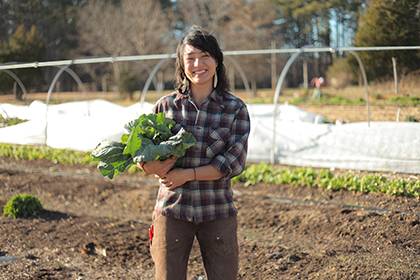Duke Campus Farm Continues to Grow
New farm manager hopes to increase attention on education, engagement

Kale, garlic and carrots aren’t the only thing growing at the Duke Campus Farm these days.
The space itself is getting new structures and plantings while farm staff has increased from two to eight Duke employees and students. That includes Saskia Cornes, the new program coordinator and farm manager who began her new job overseeing the farm in June.
Read More“Every day has been pretty busy, but it’s been exciting to meet so many different people who are invested in the farm,” said Cornes, who has worked with organic growers, students, chefs and more at University of California-Santa Cruz and organizations around the world. “I spent a lot of the summer getting to know the agricultural landscape of the farm, but now I’m focusing on understanding the institutional landscape as well.”
In addition to her background in farming, Cornes, who holds a doctorate in English literature from Columbia University, has helped design curricula in food studies for Columbia, UC-Santa Cruz and University of San Francisco. That led to planning more educational offerings to Duke community members.
“We’re looking forward to expanding our presence in academic life on campus and with students and employees,” she said.
Events this fall included a workshop on corn genetics with Duke professor Mary Eubanks and a seed-saving workshop with Doug Jones, founder of the Piedmont Biofarm. New workshops begin Jan. 28 with a visit from renowned small-scale farmer Jean-Martin Fortier, author of “The Market Gardener.” A time and place for the event will be posted on the farm’s Facebook page.
Other upcoming programs include a hands-on tutorial of how to grow mushrooms in February and an annual spring contra dance takes place in April. All activities are open to the Duke community, including year-round community workdays continue every Thursday and Sunday from 3 p.m. to 5 p.m. at the farm’s one-acre site at 4934 Friends School Road.
During volunteer workdays, students and employees can help keep the farm running by planting, harvesting, weeding and even create new projects, like upgrading the farm’s medicinal herb garden.
Farm volunteers spent time this fall restructuring the garden with students from professor Charlotte Clark’s Environmental Studies 245 class. The students conducted site visits at the Sarah P. Duke Gardens and North Carolina Botanical Gardens to learn more about native and medicinal herbs. They have also planted herbs for potential use in teas and soaps with hopes some herbs or products may even be available at the Duke Student Wellness Center. While mint, sage, lemon balm and other herbs currently grow at the farm, volunteers are hoping to start growing honeysuckle, lavender and more.
“There’s something really powerful about herbs and the healing qualities they offer,” said Liz McInerney, a project coordinator with Duke’s Child and Family Mental Health and Developmental Neuroscience Division. She’s volunteered at the farm for about two years. “They’re such a great presence and our work reflects a lot of the changes and new energy of the farm right now.”
Like the produce grown at the farm, herbs will also end up going to customers who purchase seasonal community supported agriculture boxes from the farm or in dining halls on campus, which utilize a variety of fruits and vegetables from the Campus Farm to serve to students and anyone else who dines at Duke.
“If anyone hasn’t been to the farm, they should come out soon because it’s a beautiful time to be there,” McInerney said. “It’s such a special place Duke’s created and it doesn’t matter what someone’s skill level is because everyone can contribute to the farm and their cause.”